Home » Posts tagged 'india' (Page 3)
Tag Archives: india
The Biometric Threat
The Biometric Threat
As with so many other convenient technologies, the world is underestimating the risks associated with biometric identification systems. India has learned about those risks the hard way – and should serve as a cautionary tale to the governments and corporations seeking to expand the use of these technologies.
NEW DELHI – Around the world, governments are succumbing to the allure of biometric identification systems. To some extent, this may be inevitable, given the burden of demands and expectations placed on modern states. But no one should underestimate the risks these technologies pose.
Biometric identification systems use individuals’ unique intrinsic physical characteristics – fingerprints or handprints, facial patterns, voices, irises, vein maps, or even brain waves – to verify their identity. Governments have applied the technology to verify passports and visas, identify and track security threats, and, more recently, to ensure that public benefits are correctly distributed.
Private companies, too, have embraced biometric identification systems. Smartphones use fingerprints and facial recognition to determine when to “unlock.” Rather than entering different passwords for different services – including financial services – users simply place their finger on a button on their phone or gaze into its camera lens.
It is certainly convenient. And, at first glance, it might seem more secure: someone might be able to find out your password, but how could they replicate your essential biological features?
But, as with so many other convenient technologies, we tend to underestimate the risks associated with biometric identification systems. India has learned about them the hard way, as it has expanded its scheme to issue residents a “unique identification number,” or Aadhaar, linked to their biometrics.
Originally, the Aadhaar program’s primary goal was to manage government benefits and eliminate “ghost beneficiaries” of public subsidies.
…click on the above link to read the rest of the article…
All Hell Breaks Loose In India As Violent Protests Spread After Citizenship Law
All Hell Breaks Loose In India As Violent Protests Spread After Citizenship Law
As central banks ramp up money printing to prevent the global economy from crashing, we’ve been documenting an alarming surge of social upheavals erupting across the world in 2019.
The latest unrest is spreading across India like wildfire after the Modi government passed a new law that grants citizenship to non-Muslim migrants from three Muslim-majority countries but doesn’t give Muslim migrants from those countries citizenship, reported Al Jazeera.
Called the Citizenship Amendment Bill (CAB), the new measure was passed last week and grants citizenship to non-Muslims from Pakistan, Afghanistan, and Bangladesh, who have been persecuted for their faith.
Christians, Buddhists, Sikhs, Jains, and Parsis from the three eligible countries will automatically be given citizenship if they have illegally entered the country.
So here’s where things get complicated. Rights groups and a Muslim political party have gone bonkers over the fact that Prime Minister Narendra Modi isn’t allowing Muslim migrants from the three country’s who have illegally entered India – a path towards citizenship. They say the bill violates India’s constitution that prohibits religious discrimination.
As a result of the bill, demonstrations have broken out across the country, including in New Delhi and various large cities in several states.
…click on the above link to read the rest of the article…
Bill Gates Wants to Export India’s National ID System Around the Globe
Bill Gates Wants to Export India’s National ID System Around the Globe

It’s not just a social credit score system spreading around the world from China that threatens the free people of the world; India’s Aadhaar National ID program has the full support of Bill Gates and the World Bank as a model for other countries to follow.
Gates said in a 2018 CNBC interview that it was “too bad” if someone thought that Aadhaar was a privacy issue:
The Gates Foundation has pledged to fund the World Bank in an effort to take the ID program to other countries.
Despite Gates plea that there are no privacy issues with Aadhaar, several court cases have gone to India’s supreme court on grounds of privacy violations.
The ID system has had serious security breaches, with access to a billion identities being sold for less than $10 through WhatsApp.
One of the court filings (Mathew Thomas vs Union of India) details the rise of China’s social credit system, comparing the Indian Aadhaar initiative to the Chinese program.
Perhaps the most sensational angle to this story is that the same international tech company that provides the infrastructure to Aadhaar also makes drivers licenses in the United States.
Idemia (formerly Morpho), is a billion dollar multinational corporation. It is responsible for building a significant portion of the world’s biometric surveillance and security systems, operating in about 70 countries. Some American clients of the company include the Department of Defense, Homeland Security, and the FBI.
The company website says that Morpho has been “…building and managing databases of entire populations…” for many years.
In the United States, Idemia is involved in the making of state issued drivers licenses in 42 states.
…click on the above link to read the rest of the article…
BRICS Nations Discuss Shared Crypto to Break Away From USD and SWIFT
BRICS Nations Discuss Shared Crypto to Break Away From USD and SWIFT

ANALYSIS
Brazil, Russia, India, China and South Africa, or the BRICS economic bloc, are engaging in discussions to issue cross-national digital money in order to reduce the dependence of their economies on the United States, as reported by Cointelegraph on Nov. 14. What will the new cryptocurrency look like, how does the BRICS group plan to use it and are there any existing projects underway that seek to achieve a similar goal of independence on such a high level?
BRICS and its problems
BRICS is the largest geopolitical block of countries, spanning three continents and wielding substantial economic power in global affairs. As of 2018, the five nations of the BRICS block had a combined nominal gross domestic product of $40 trillion, or about 23.2% of the gross world product.
However, such economic power does not come without competitive penchants from other nations that are vying for the markets that BRICS nations cater to. The greatest competition comes from the European Union and the U.S.
The political experience of recent years has shown that BRICS countries’ diplomacy has arguably failed in alleviating international sanctions, especially in politically sensitive markets such as the arms and the energy carriers markets. However, advances in technology are here to help out where politics cannot, as blockchain and digital assets have the potential to open entirely new horizons for finance.
The idea of a single cryptocurrency as a means of payments and value transmission is not a new one, but it is one that is being actively purported not only in countries like Venezuela with its Petro, but also among BRICS countries. The advantages of a single cryptocurrency as a universal means of settlements among BRICS nations would solve many of the problems they face on the global economic market.
…click on the above link to read the rest of the article…
Kudankulam Nuclear Power Plant Hit By Cyberattack
Kudankulam Nuclear Power Plant Hit By Cyberattack
India’s second nuclear power unit stopped operating on 19th October 2019. It is suspected that the Kudankulam Nuclear Power Plant was hit by a cyberattack and the authorities were already alerted of the threat months in advance. Even as cybersecurity experts are investigating the case, the authorities were quick to dismiss any occurrence of a spyware infiltrating their systems. The power plant project built in collaboration with Russia has been a target of foreign players since its inception.

Nuclear Power Unit stops operating
The second 1,000 MW nuclear power unit at Kudankulam, owned by the Nuclear Power Corporation of India Ltd (NPCIL) stopped power generation on Saturday 19th October, said Power System Operation Corporation Ltd (POSOCO). The atomic power plant stopped generation about 12.30 a.m. on Saturday owing to “SG level low”, the company added. The expected date of the unit’s revival is not known. The NPCIL has two 1,000 MW nuclear power plants at Kudankulam Nuclear Power Project (KNPP) built with Russian equipment.

While cybersecurity experts are investigating the breach, the Kudankulam Nuclear Power Plant in Tamil Nadu has denied being the victim of a cyber attack and denied any incident of a spy virus having infected the systems at the plant. The statement asserted that since “Kudankulam Nuclear Power Plant Project (KKNPP) and other Indian Power Plants Control Systems are stand alone and not connected to outside cyber network and Internet, any cyberattack on the Nuclear Power Plant Control Systems is not possible.” This however, is a false assertion which was exposed when Israeli intelligence targeted Iranian Nuclear facility (which also was not connected to Internet) with Stuxnet.
…click on the above link to read the rest of the article…
“Contagion Runs The Risk Of Spreading” In India’s Financial Sector, Rating Agency
“Contagion Runs The Risk Of Spreading” In India’s Financial Sector, Rating Agency
India, one of the largest emerging markets in the world, is at serious risk of widespread contagion ripping through its banking sector as many large financial companies have already seen their equity value halved over the last 12 months, S&P Global Ratings said in a report on Wednesday, also reported by Bloomberg.

India’s shadow lenders, also called non-banking finance companies, have been under severe pressure since the collapse of Infrastructure Leasing and Financial Services (IL&FS) last Sept., which was on the 10th anniversary of the bankruptcy of Lehman Brothers.
“India’s finance companies are among the country’s largest borrowers. A substantial part of this funding comes from banks. The failure of any large non-banking financial company or housing finance company may deliver a solvency shock to lenders,” said S&P Global Ratings credit analyst Geeta Chugh.
According to the report, the next big banking failure in India could run the risk of disrupting local credit markets, interbank markets, payments, and even damage economic growth.
“This contagion runs the risk of spreading to real estate companies too. Finance companies are the largest lenders to this segment and any failure among such institutions could jeopardize credit flows to developers,” Chugh said.
“The credit profile of a bank could deteriorate sharply due to outsized exposure to weak entities, huge market or operational losses, or significant deposit withdrawals if the depositors lost confidence in the bank,” Chugh added. “A governance deficit could also quickly turn to a trust deficit, hurting the stability of a bank.”
It’s likely that if one Indian bank fell, “the contagion could spread to other banks perceived to be struggling with the same problems as the failing bank,” S&P warned.
…click on the above link to read the rest of the article…
Pakistan Threatened India With Nuclear War and No One Noticed
Pakistan Threatened India With Nuclear War and No One Noticed
A nuclear-armed state threatened another nuclear armed-state with nuclear war and no one’s talking about it.

(TMU Op-Ed) — In a recent interview with Al-Jazeera, Pakistan’s Prime Minister Imran Khan made some controversial statements regarding the use of nuclear weapons against India.
First, Khan started off by saying he was anti-war—a “pacifist.” He then developed his stance, stating that “when two nuclear-armed countries fight, if they fight a conventional war, there is every possibility that it is going to end up into nuclear war.” However, this scenario, as Khan described, is “the unthinkable.”
Khan went on to say:
“If say Pakistan, God forbid, we are fighting a conventional war, we are losing, and if a country is stuck between the choice; either you surrender or you fight ‘til death for your freedom, I know Pakistanis will fight to death for their freedom.
So when a nuclear-armed country fights to the end, to the death, it has consequences.”
Granted, Khan spoke to RT not long after in an attempt to provide a disclaimer to these eye-opening statements. But for all intents and purposes, the nuclear elephant in the room is no longer hiding.
Throughout the last week, the top global news story was the recent drone attack on a major Saudi Aramco facility, which was unanimously pinned on Iran. The whole world appears to be bracing for a regional confrontation between the Kingdom of Saudi Arabia and Iran, and what would inevitably be another disastrous war in which the U.S. finds itself intervening heavily on the side of Riyadh, if it doesn’t take the lead and strike Iran directly itself.
…click on the above link to read the rest of the article…
“It Is Ours!” Indian Minister Says Islamabad About To “Lose Pakistani-occupied Kashmir”
“It Is Ours!” Indian Minister Says Islamabad About To “Lose Pakistani-occupied Kashmir”
A top Indian official has put Islamabad on notice, saying India’s nuclear-armed neighbor “should be ready to lose Pakistani-occupied Kashmir,” in perhaps the most provocative statement yet since New Delhi’s revoking its own administered Jammu and Kashmir (J&K) historic autonomy on August 5.
Gujarat Chief Minister Vijay Rupani was quoted by local media as making the inflammatory statement, saying—
“Now, Pakistan-occupied Kashmir (PoK) too is ours … For fulfilling the dream of united India, we are ready to move forward for PoK.”
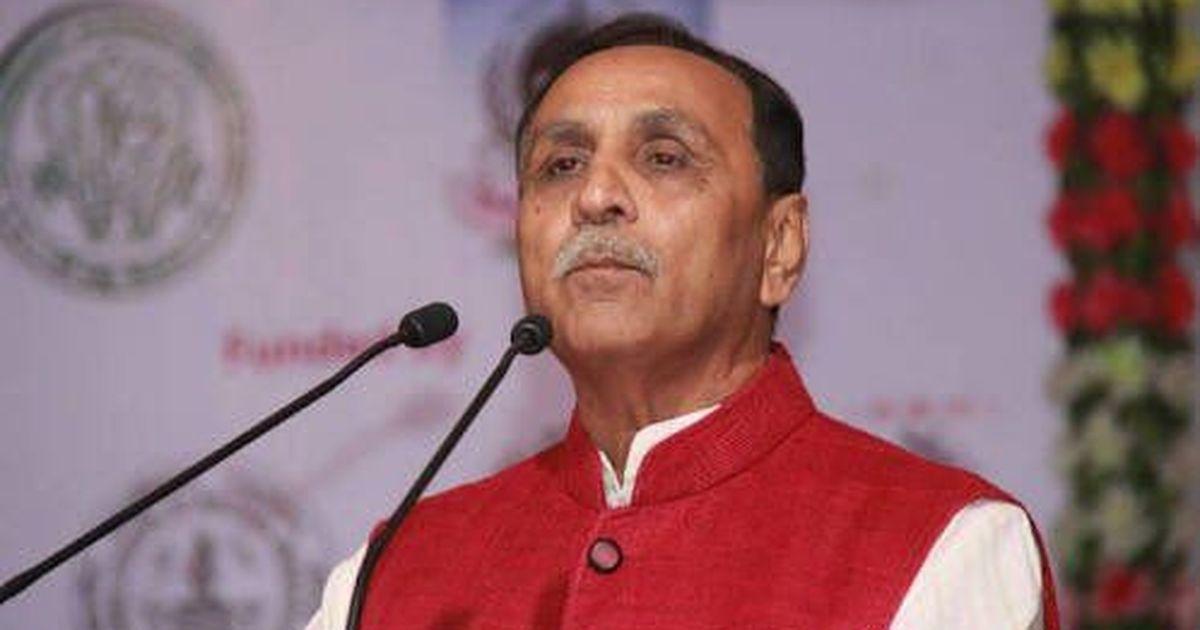
“Article 370 has been revoked. Now, Pakistan occupied Kashmir (PoK) too is ours. Pakistan should be ready to lose PoK. For fulfilling the dream of united India, we are ready to move forward for PoK… Pakistan should stop supporting terrorism… India will not tolerate this,” he asserted while speaking at a political rally, according to India Today.
And further referencing the 1971 Indo-Pakistani war in which Bangladesh was liberated, the Chief Minister responded to recent statements by Pakistan’s Prime Minister Imran Khan. “Pakistan was boasting of occupying Delhi in 1971 but they were about to lose Karachi. Bangladesh was partitioned. Their Army became our refugees,” he said.
This comes after Pakistan’s foreign minister Shah Mehmood Qureshi warned last week that the situation on the Line of Control (LoC) in the Jammu and Kashmir region continues to deteriorate and risks sparking an “accidental war,” as reported in the Hindustan Times.
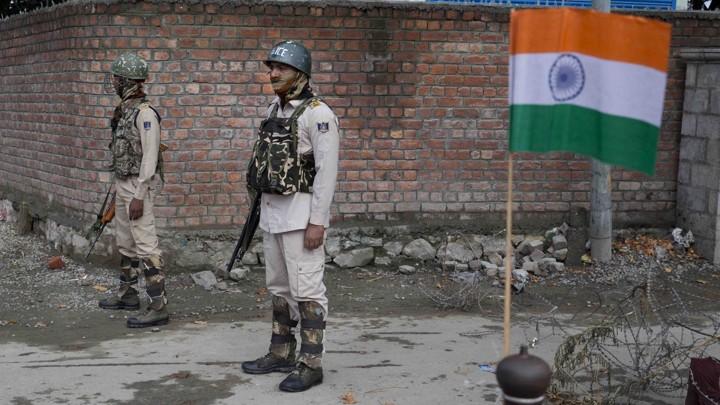
Qureshi was speaking on the sidelines of the UN Human Rights Council in Geneva last Wednesday. He told journalists that Pakistan and India “understand the consequences of a conflict”. But he added that “an accidental war” cannot be ruled out. “… If the situation persists … then anything is possible,” he said.
…click on the above link to read the rest of the article…
Pakistan Suspends Bilateral Trade With India, Expels Envoy
Pakistan Suspends Bilateral Trade With India, Expels Envoy
The Kashmir crisis triggered by India’s revoking of Article 370 from its constitution has exploded into a fast escalating renewed crisis between nuclear armed arch-rivals India and Pakistan.
Merely within the last 24-hours Pakistan has recalled its ambassador while expelling its Indian envoy, and more importantly has taken the drastic step of suspending bilateral trade with India.
“We will call back our ambassador from Delhi and send back their envoy,” foreign minister Shah Mehmood Qureshi announced in televised comments, according to the AFP, while a separate government statement declared trade suspended and a downgrading of diplomatic ties.
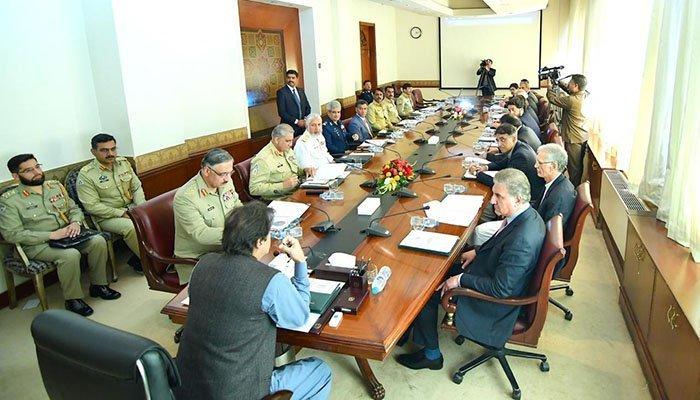
The committee has decided on “downgrading of diplomatic relations with India” and “suspenstion of bilateral trade with India,” according to the statement.
PM Khan further directed the military to “continue vigilance” after previously saying Pakistan would take “all possible options” in support of Kashmir’s Muslim-majority population – this after regional media has reported “tens of thousands” of Indian troops have surged into Jammu and Kashmir (J&K), while a phone and internet blackout is in place.
In a worrisome sign that the two historic rivals and neighbors could be again moving to open war, Khan is reported to have said, “We have to choose between dishonor and war.”
Pakistan’s foreign minister informed the United Nations early this week it is prepared to act in response to the “critical situation”- which Khan reiterated to the high level defense committee meeting Wednesday.
The now voided Article 370 is legally and historically what assured a high degree autonomy for the Indian administered Muslim-majority state, enshrined in the constitution, which inhabitants there see as justifying remaining part of India. The Hindu nationalist Bharatiya Janata leadership in New Delhi, led by Prime Minister Narendra Modi, revoked J&K’s status quo ability and rights to maintain their own local governance on Monday.
…click on the above link to read the rest of the article…
Pakistan’s Army “Prepared” To Support Kashmir As PM Khan Warns “More Suicide Attacks” Coming
Pakistan’s Army “Prepared” To Support Kashmir As PM Khan Warns “More Suicide Attacks” Coming
After yesterday’s unprecedented revocation of an over 50-year old constitutional article which gave Indian-administered Kashmir special autonomous status, Pakistan’s army has shot back in provocative statements saying it will “go to any extent” to support Kashmiris amid an Indian military crackdown. “Pakistan Army firmly stands by the Kashmiris in their just struggle to the very end,” said General Qamar Javed Bajwa after meeting with top commanders over the crisis.
“We are prepared and shall go to any extent to fulfill our obligations in this regard,” he added, without specifying what form this might take. At the same time Pakistan’s foreign minister informed the United Nations it is prepared to act in response to the “critical situation”.
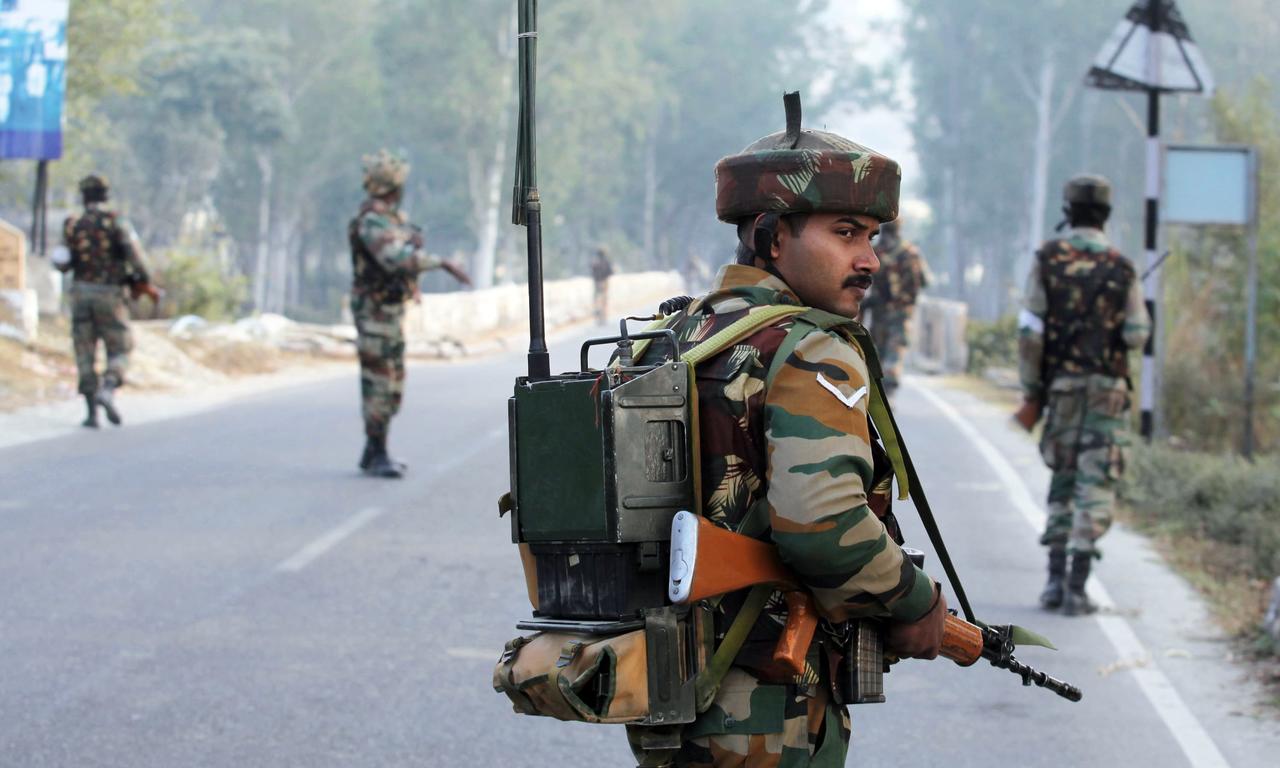
The now voided Article 370 is legally and historically what assured a high degree autonomy for the Indian administered Muslim-majority state, enshrined in the constitution, which inhabitants there see as justifying remaining part of India. The Hindu nationalist Bharatiya Janata leadership in New Delhi, led by Prime Minister Narendra Modi, revoked the Jammu and Kashmir’s (J&K) status quo ability and rights to maintain their own local governance on Monday.
We noted this could put India and Pakistan on a direct collision course for war, following reports of weekend shelling in the contested region by Indian forces — indeed CNN has reported Indian-controlled Kashmir is on “lockdown” with phone lines and internet cut, as tens of thousands of Indian troops have been freshly deployed, and with key prominent local politicians under house arrest.
Videos out of Jammu posted to social media showed uniformed Indian soldiers filing through the streets in densely populated towns immediately following the revocation of Jammu and Kashmir’s special status.
…click on the above link to read the rest of the article…
India Answers Pakistan’s Missile Test With Daring Raid On “Most Wanted Militant” In Kashmir
India Answers Pakistan’s Missile Test With Daring Raid On “Most Wanted Militant” In Kashmir
After a couple months of uneasy calm following the late February crisis over Kashmir involving two down Indian jets which allegedly entered Pakistani-administered territory to raid a “terror compound” it appears the long disputed border region is heating up again. And this a day after Pakistan on Thursday decided to use the moment of Indian Prime Minister Narendra Modi’s landslide victory to a second 5-year term in the world’s largest general election to test fire a ballistic missile with a reported 1,500 kilometer range.
It appears India has hit back in its own symbolic way, signalling it will stick by its pledge to root out jihadist militants in Kashmir, which New Delhi has long charged Pakistan with harboring and supporting. Early Friday India announced its forces raided the home of a top al-Qaeda commander in southern Kashmir the night before, sparking widespread anti-India protests in the Muslim-majority region. Zakir Rashid Bhat (also known as Zakir Musa), head of Ansar Ghazwat-ul-Hind, a group affiliated with Al-Qaeda, via The India Times
Twenty-five year old terrorist Zakir Rashid Bhat (also known as Zakir Musa), described as India’s “most wanted militant,” was reportedly trapped when Indian commandos set fire to his three-story house, leading police shooting and killing him during a counterinsurgency operation in the southern Tral area. “As we were clearing debris from the house, he tried to get up. Our troops fired at him and he was killed,” one police official told Reuters.
The controversial raid has again put tensions with Pakistan on edge, and has further forced Indian authorities to place the administrative region on lock down, fearing the spread of more unrest. According to Reuters:
…click on the above link to read the rest of the article…
45 Million Indians In Path Of Dangerous Cyclone Fani, Landfall Friday
45 Million Indians In Path Of Dangerous Cyclone Fani, Landfall Friday
Cyclone Fani is crossing over the Indian Ocean with speeds above 200 km/h (127 mph), is expected to make landfall on Friday in the state of Orissa, an eastern Indian state on the Bay of Bengal that has a population of roughly 45 million, reported CNN.
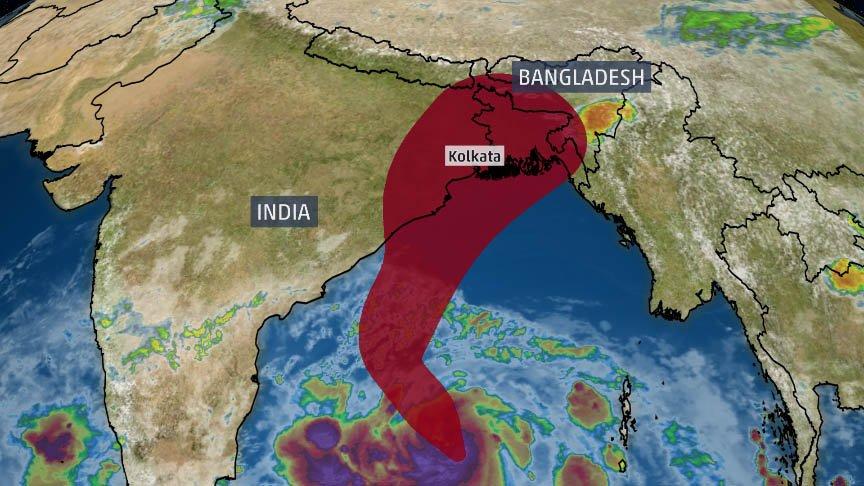
Fani has been labeled as an “extremely severe cyclonic storm” by Indian government officials, prompting them to call up the Coast Guard and Navy to deploy ships, ground vehicles, and helicopters for relief and rescue operations through the weekend. Military units have established temporary camps in Odisha, West Bengal and Andhra Pradesh states, on standby to assist local law enforcement in search and rescue operations once the storm passes.
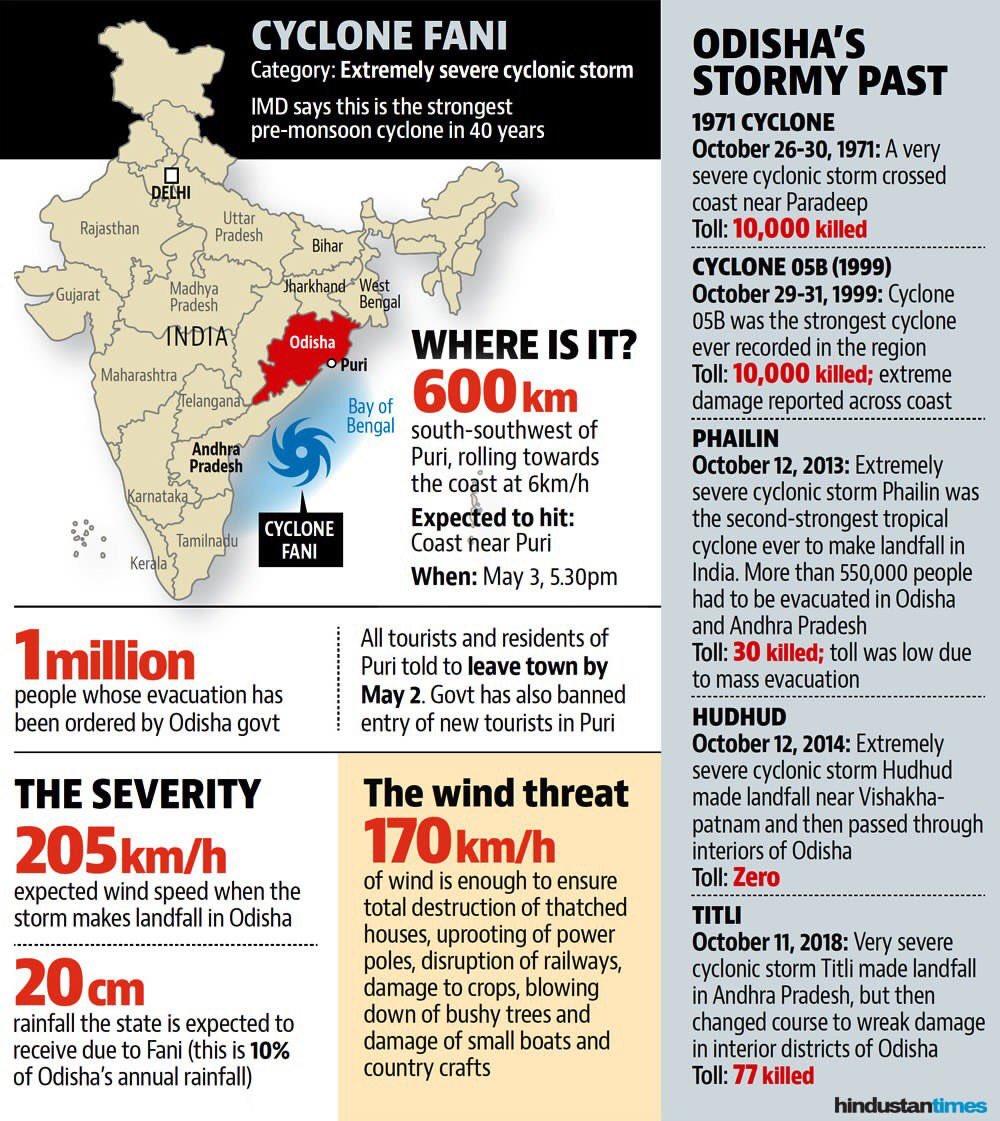
Across Odisha, more than 900 shelters have been erected to house evacuees, and the school system has been shut down across the state for the foreseeable future.
“They are being told what to take with them if they leave and the precautions they need to take if they stay,” said Ameya Patnaik, assistant commandant for the National Disaster Response Force (NDRF) in Odisha.
More than 1 million people have been evacuated from Odisha. Evacuations have also begun in Andhra Pradesh, while those in West Bengal have been told by government officials to be ready to leave, said CNN.
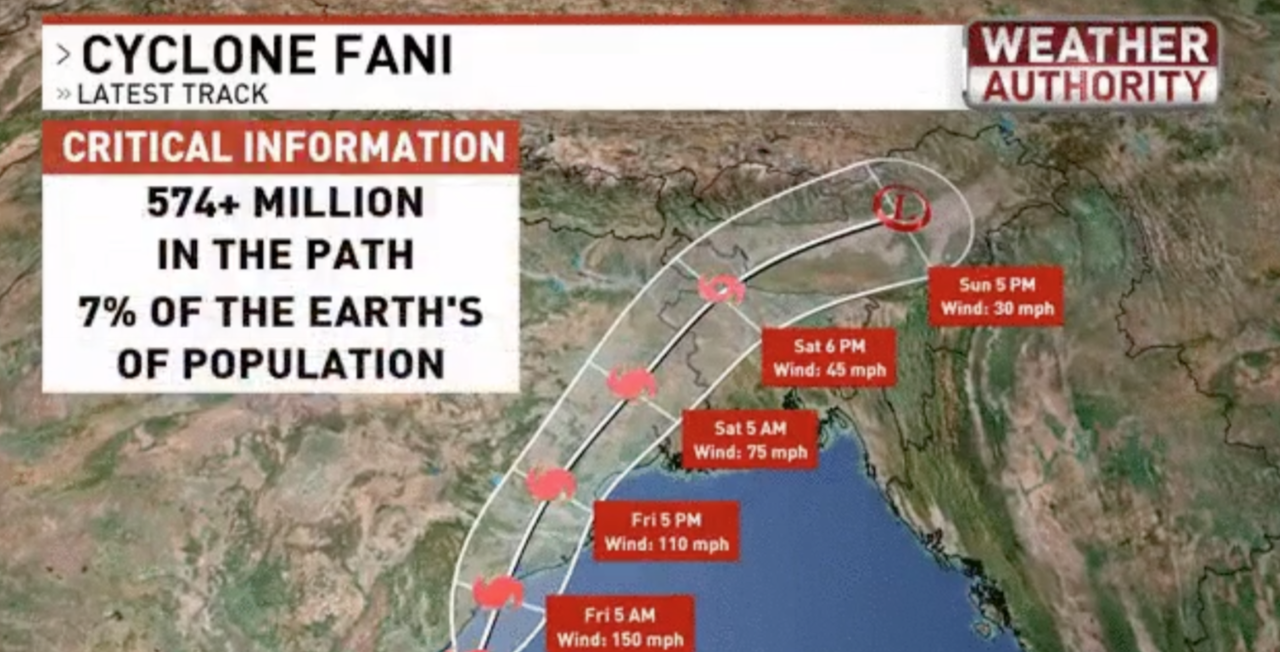
Fani will bring massive storm surges and significant wind damage near the landfall location. Inland flooding will be a significant threat. Portions of eastern India and Bangladesh can expect 6 to 12 inches of rain. As Fani approaches India, it will be moving nearly parallel to the coast.
Nuclear Nightmare: India and Pakistan are on the Brink
Nuclear Nightmare: India and Pakistan are on the Brink
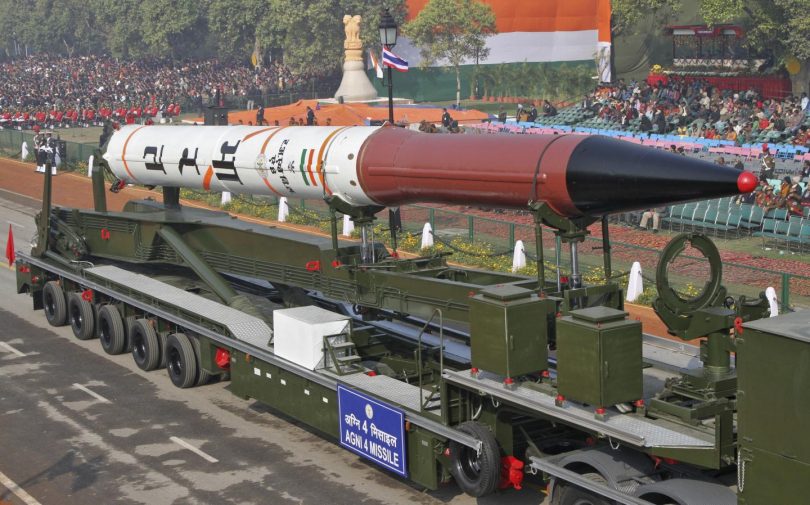
India and Pakistan are in the throes of the most serious military standoff between them since 2002. After years of absorbing terror attacks conceived by non-state groups based on Pakistani soil, India decided enough was enough after a February 14 vehicle-borne improvised explosive device killed forty paramilitary personnel. It’s response? An airstrike on what it claimed was a camp run by Jaish-e-Mohammed, the group that claimed the attack, on Pakistani soil.
That retaliation was immediately celebrated in India, where it was seen as a show of muscular resolve—a message that New Delhi wouldn’t simply allow Pakistan’s tolerance and covert encouragement of the non-state groups to go unpunished. But the strike humiliated Pakistan’s defense establishment, which was perceived to have been caught off-guard.
India described the strike as preemptive and driven by highly specific intelligence about a credible imminent threat. Critically, New Delhi underscored that the targets were “non-military”—that it wasn’t looking to start a war. In any case, Pakistan’s version of events was sharply divergent, with its military claiming that India had struck nothing more than foliage.
There was some recent precedence to make sense of the initial Indian strike and Pakistan’s response. New Delhi had retaliated to a lower-casualty attack in Kashmir in September 2016 by conducting what it called “surgical strikes” into Pakistan-administered Kashmir, taking out facilities used by terrorists. Pakistan simply wrote off that action and took the public position that nothing had happened, offering a face-saving off-ramp for both sides that prevented a crisis like the one we’re seeing today from bubbling up.
…click on the above link to read the rest of the article…
“This Is Unprecedented Territory” – Pakistan Shoots Down 2 Indian Fighter Jets In Dramatic Border Conflict Escalation
“This Is Unprecedented Territory” – Pakistan Shoots Down 2 Indian Fighter Jets In Dramatic Border Conflict Escalation
Update and recap: After some initial confusion and conflicting statements about the number of aircraft involved in Wednesday’s hostilities, Bloomberg has produced this roundup of remarks from both sides that helps to clear things up.
- Indian and Pakistani fighter jets engaged each other, resulting in the worst escalation since the war between the two in 1971.
- Pakistan said it engaged six targets across the de facto border between the nuclear-armed neighbors. Pakistan said its fighter planes shot down two Indian fighter aircraft that entered its airspace. Two Indian pilots were in its custody, one of them in hospital.
- India admitted to losing one MiG 21 fighter jet in the aerial engagement. India’s Kumar said the pilot of the plane is “missing in action,” and the government is ascertaining Pakistan’s claim of their custody. India said it shot down a Pakistani fighter jet today.
- Pakistan PM Imran Khan in his address to the nation sounded conciliatory, saying he was willing to investigate the Feb. 14 terror attack in Kashmir. He said a war won’t be in his or in Indian Prime Minister Narendra Modi’s control and called for a dialogue between the two.
- China’s Foreign Minister Wang Yi called for India and Pakistan to exercise restraint and offered to play a “constructive role,” while U.S. Secretary of State Mike Pompeo urged the two nations to “avoid escalation at any cost.”
* * *
Markets had already been bracing for an insanely busy session – with risks ranging from Trump’s meeting with Kim Jong Un in Hanoi, to Michael Cohen’s Congressional testimony, to Fed Chair Jerome Powell’s second testimony before the House Financial Services Committee (including Maxine Waters and AOC) – when they were confronted in the early morning hours on Wednesday with the prospect for nuclear war along one of the world’s most volatile borders.
…click on the above link to read the rest of the article…




